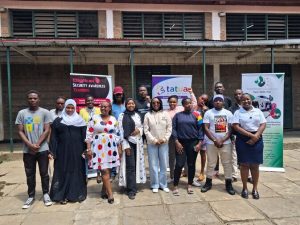I say this in jest…perhaps what’s necessary is ‘How the Internet works’ primer. That would very quickly demystify the idea that there are certain people called ‘ICT Practitioners’.
> On 19 Sep 2018, at 13:44, Thomas Kaberi via kictanet <kictanet@lists.kictanet.or.ke> wrote:
>
>
> This is a very contentious issue with multiple and divergent interests.
>
> As Ali would put it Kila mwamba ngoma is going to vuta kwake
>
> But let me start with congratulating you all for showing up to do this again, it clearly wasn’t going to be a one time stand
>
> On top of just fighting, this time we must be the ones to figure it out as well.
>
> As some fight and others make noise and throw tantrums, while the majority flee and bury their heads — in true Kenya style…
>
> I have listed below 11 key lessons we could borrow from the previous lobbying efforts in the first round.
>
> They are:
>
> 1. Find out the political reasons behind the bill
> — there is always a few and they are the only ones that matter.
>
> 2. Work with the mover and chairs very very closely but don’t forget the researchers, committee members and support staff.
> —major influences oftenly ignored to the peril of many.
>
> 3. Lobby both one on one and committee.
> —The members are smart human beings with personal views and positions that may not surface in group hearings for political and other reasons.
>
> —The one on one’s give a view into the undercurrents and nuances in the committee proceedings preparing us not to react but respond effectively.
>
> 4. Have a unified agenda and scenarios for both the fundamentals and specifics.
>
> –generalities and differences only serve to make the point that we are disorganised and don’t know what we want.
>
> 5. Give specific line by line recommendations.
> –It easier to negotiate specifics
>
> 6. Educate the committee members about implications of each clause.
> –don’t assume they know and or connect with your views and context.
>
>
> 7. This is going to be a hard, rough and windy road thus plan for both the best and worst outcomes.
> –Frastration is a key strategy in the making of sausages that lawmaking is.
>
> 8. That even within the sector we will detractors, armchair critics and lone ranger self seekers.
>
> —not everyone is saying what they mean and not few things are what they seem to be.
>
> 10. Focus on what people really need beyond what what they seem to seek.
> — Be open to giving more than you expect to give and take much less than you bargain for.
>
> 11. Whoever hangs on long enough will have the best chance to win.
> –We’ve done it before and we can do it again and again if that’s what it takes.
>
> On Wed, Sep 19, 2018, 9:21 AM Barry Macharia via kictanet <kictanet@lists.kictanet.or.ke <mailto:kictanet@lists.kictanet.or.ke>> wrote:
> Dear All
>
> This is back in parliament again
>
> www.cio.co.ke/kenyas-controversial-ict-practitioners-bill-re-emerges/ <www.cio.co.ke/kenyas-controversial-ict-practitioners-bill-re-emerges/>
>
>
>
>
> regards
> Barry
>
> _______________________________________________
> kictanet mailing list
> kictanet@lists.kictanet.or.ke <mailto:kictanet@lists.kictanet.or.ke>
> lists.kictanet.or.ke/mailman/listinfo/kictanet <lists.kictanet.or.ke/mailman/listinfo/kictanet>
> Twitter: http://twitter.com/kictanet
> Facebook: www.facebook.com/KICTANet/ <www.facebook.com/KICTANet/>
> Domain Registration sponsored by www.eacdirectory.co.ke <www.eacdirectory.co.ke/>
>
> Unsubscribe or change your options at lists.kictanet.or.ke/mailman/options/kictanet/thomaskaberi%40gmail.com <lists.kictanet.or.ke/mailman/options/kictanet/thomaskaberi%40gmail.com>
>
> The Kenya ICT Action Network (KICTANet) is a multi-stakeholder platform for people and institutions interested and involved in ICT policy and regulation. The network aims to act as a catalyst for reform in the ICT sector in support of the national aim of ICT enabled growth and development.
>
> KICTANetiquette : Adhere to the same standards of acceptable behaviors online that you follow in real life: respect people’s times and bandwidth, share knowledge, don’t flame or abuse or personalize, respect privacy, do not spam, do not market your wares or qualifications.
> _______________________________________________
> kictanet mailing list
> kictanet@lists.kictanet.or.ke <mailto:kictanet@lists.kictanet.or.ke>
> lists.kictanet.or.ke/mailman/listinfo/kictanet <lists.kictanet.or.ke/mailman/listinfo/kictanet>
> Twitter: http://twitter.com/kictanet
> Facebook: www.facebook.com/KICTANet/ <www.facebook.com/KICTANet/>
> Domain Registration sponsored by www.eacdirectory.co.ke <www.eacdirectory.co.ke/>
>
> Unsubscribe or change your options at lists.kictanet.or.ke/mailman/options/kictanet/kaninimutemi%40gmail.com
>
> The Kenya ICT Action Network (KICTANet) is a multi-stakeholder platform for people and institutions interested and involved in ICT policy and regulation. The network aims to act as a catalyst for reform in the ICT sector in support of the national aim of ICT enabled growth and development.
>
> KICTANetiquette : Adhere to the same standards of acceptable behaviors online that you follow in real life: respect people’s times and bandwidth, share knowledge, don’t flame or abuse or personalize, respect privacy, do not spam, do not market your wares or qualifications.
_______________________________________________
kictanet mailing list



